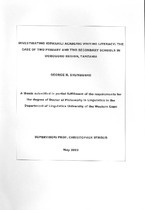| dc.contributor.advisor | Stroud, Christopher | |
| dc.contributor.author | Shumbusho, George N. | |
| dc.contributor.other | Dept. of Linguistics, Language and Communication | |
| dc.contributor.other | Faculty of Arts | |
| dc.date.accessioned | 2014-02-03T07:50:29Z | |
| dc.date.available | 2010/07/21 00:00 | |
| dc.date.available | 2010/08/22 | |
| dc.date.available | 2014-02-03T07:50:29Z | |
| dc.date.issued | 2009 | |
| dc.identifier.uri | http://hdl.handle.net/11394/2685 | |
| dc.description | Philosophiae Doctor - PhD | en_US |
| dc.description.abstract | The purpose of the current study was to examine whether pupils/students master academic literacy and if various genres are taught appropriately. In other words whether pupils/students master academic literacy in a way that would allow them to benefit from a transition into Kiswahili as a language of instruction at secondary school level and probably beyond. The study was carried out in two primary and two secondary schools in Morogoro and Mvomero Districts of Morogoro region in Tanzania. The study is essentially qualitative, and employed ethnographic design. In this regard, three methods of data collection were used namely: interviews, classroom observations and texts analysis. The study is located within the New Literacy Studies (NLS) perspective as a general interpretative theoretical framework. The analysis of data was done using Systemic Functional Linguistics (SFL), Genre analysis and Christie's Curriculum genres and macrogenres. | en_US |
| dc.language.iso | en | en_US |
| dc.publisher | University of the Western Cape | en_US |
| dc.subject | Swahili language | en_US |
| dc.subject | Study and teaching | en_US |
| dc.subject | Swahili linguistics | en_US |
| dc.subject | Literacy | en_US |
| dc.subject | Tanzania | en_US |
| dc.title | Investigating Kiswahili academic literacy: the case of two primary and two secondary schools in Morogoro region, Tanzania | en_US |
| dc.type | Thesis | en_US |
| dc.rights.holder | University of the Western Cape | en_US |
| dc.description.country | South Africa | |

